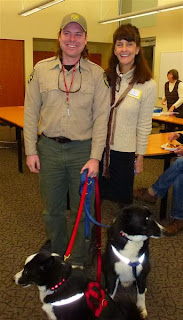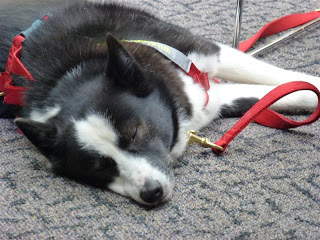Bear Talk with Mario Klip
As part of AAUW's programs, I was excited to arrange today's guest speaker, Mario Klip. Mr. Klip is the California Department of Fish and Game's Bear Biologist.
As a Ph.D student, Mario's focus of study is Tahoe's Black Bear: its characteristics, home range, how much time they spend in urban areas and and the use of Aversive Conditioning. This conditioning was what I found extremely interesting and hopeful.
When bears become a 'problem' to humans, many times they must be lethally removed from neighborhoods. We have seen first hand, in our area due to weekenders who leave their trash behind, conditioning the bear to dine ala trash can. If a bear finds food without getting chased away, he may well come back for more. Each time he returns for a free meal and doesn't get frightened away, he can become less fearful of humans—and this habituation can lead to problems.
Mario's research involves frightening these gentle giants by using "adverse conditioning". When a bear is found doing what he ought not, Mario employs rubber bullets and unleashes his adorable, trained Karelian Bear dogs, Villa and Sasha (a big hit at this meeting). It takes time, resources and true dedication, but his studies show that this works.
Bears were here before us, and if we care and look at non lethal options, they will continue to be free, wild and alive- part of what makes Tahoe such a special, natural treasure. To support Mario's efforts, which are solely paid for by him, please send a donation to:
As a Ph.D student, Mario's focus of study is Tahoe's Black Bear: its characteristics, home range, how much time they spend in urban areas and and the use of Aversive Conditioning. This conditioning was what I found extremely interesting and hopeful.
When bears become a 'problem' to humans, many times they must be lethally removed from neighborhoods. We have seen first hand, in our area due to weekenders who leave their trash behind, conditioning the bear to dine ala trash can. If a bear finds food without getting chased away, he may well come back for more. Each time he returns for a free meal and doesn't get frightened away, he can become less fearful of humans—and this habituation can lead to problems.
Mario's research involves frightening these gentle giants by using "adverse conditioning". When a bear is found doing what he ought not, Mario employs rubber bullets and unleashes his adorable, trained Karelian Bear dogs, Villa and Sasha (a big hit at this meeting). It takes time, resources and true dedication, but his studies show that this works.
Bears were here before us, and if we care and look at non lethal options, they will continue to be free, wild and alive- part of what makes Tahoe such a special, natural treasure. To support Mario's efforts, which are solely paid for by him, please send a donation to:
Sierra State Parks Foundation
Attn: Human/Bear Projects
P.O. Box 28
Tahoe City, CA 96145
Attn: Human/Bear Projects
P.O. Box 28
Tahoe City, CA 96145




1 comments:
We were happy to learn that Mario uses square bear traps in his research (for catch & release with aversion tactics), and that the DFW uses cylindrical traps (for nuisance bears that will likely be put down). It was also interesting to learn why aversion is better than relocation. But, I'm sad to realize that when a bear roams through our neighborhood, instead of savoring the moment, we should be using aversion tactics to scare him off. It's just such a beautiful animal & wonderful sight to behold. I know, I know, ~in the wild.
Post a Comment